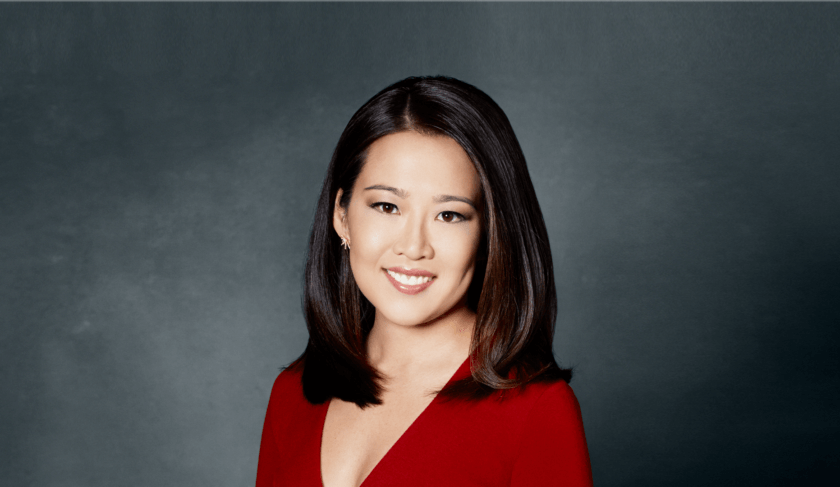
Long before Melissa Lee was the host of CNBC’s “Fast Money” and “Options Action,” she was pre-med at Harvard. Now the Emmy-nominated anchor is sharing investing advice normally reserved for Wall Street big-wigs. How did Lee make the career change from becoming a doctor to getting a Gerald Loeb Award nomination for reporting on the fall of Lehman Brothers?
On this episode of the new podcast How She Does It, host Karen Finerman talks to Lee, her CNBC colleague, about making pivots — big and small — all along the way.
NEVER MISS AN EPISODE: Download and listen to How She Does It wherever you listen to podcasts.
How to Accept (and Prepare For) a Career Change
Going from pre-med at Harvard to hosting CNBC shows didn’t happen overnight. But Melissa Lee remembers what happened when she decided to leave the doctor dreams behind.
“That was the first disappointment to my parents in terms of taking the path less favored,” she says. After transitioning to studying journalism in college, Lee was struggling to find work. “After I did all these internships in newspapers in college, and when I graduated or when I was about to graduate, I couldn’t get a job.”
Instead, she went into consulting. After graduating from college, she started her career consulting for Mercer Management. Having cases that focused on banking and credit cards helped her when she made the move to CNN Financial News and Bloomberg TV. The pivot prepared her career change when later on, she landed at CNBC, where she’s been for almost two decades.
“I started as a production assistant at CNN Financial News,” she says. “From there, I always had it in my head that I wanted to be on air. I didn’t go there to print scripts for the rest of my life or fetch coffee for other people. But to plot that, You sort of had to see where the opportunity was in the newsroom.”
Before she got on air, she would work with reporters to see what they did. She tagged along with them on shoots and helped log their tape.
“I’d do anything to make their lives easier, so they would continue taking me on shoots,” she says. “And eventually I said, you know what? I want to be a producer. I want a track to be on air.”
She moved onto Bloomberg TV, which was starting its TV operations. She ran the assignment desk and helped other reporters produce stories. After writing a few scripts, she asked her boss if she could do a voiceover for a story. They did, and they kept giving her opportunities to grow.
“You have to see where the opportunity is and just press,” she says. “Make your case and just say, ‘I am worth a shot.’”
SUBSCRIBE: Whether it’s a life change or a career change, stay up-to-date and get the HerMoney newsletter delivered fresh to your inbox every week!
What It Looks Like To Take Risks
Lee’s parents weren’t happy when she dropped pre-med to pursue other passions. When she graduated college and worked as a consultant, her parents offered her a proposition: go back to school for business and they’ll pay for it.
“They said ‘we will pay for your business school, but you have to come back and pay off that debt by working for us for three years,’” Lee recalls. “And I was like, ‘oh, that’s a long time. I’m gonna be like 24.That’s so old. What am I gonna do?’”
While her father was her main source of advice, he suggested that she never turn down free education. But that’s not the route she went.
“After a while I thought about it, and [decided] that if I don’t pursue journalism, I’m gonna regret it for the rest of my life,” she says. “I think I need to give it a try.”
And she did. She remembers thinking that if she wasn’t on the air by the time she was 30, she’d go back to business school.
She didn’t go back to business school.
READ MORE: Reinvent Your Career and Learn How to Pivot Into A Career You Love
‘What Have You Got to Lose?’
When thinking about some of the challenges she faces, Lee remembers some of her mother’s very simple, yet very impactful advice.
“She was very entrepreneurial and did a lot of different things, but she never took no for an answer,” she says. “She always said to me, ‘what have you got to lose?’”
Lee remembers a family trip to China, where they had finished climbing the Great Wall of China. At the base, there was a vendor selling shirts that read “I just climbed the Great Wall of China” and Lee’s mother wanted to buy one for every family member.
“The vendor named her price and my mom said ‘No — how about 10 t-shirts for one US dollar?’” Lee says. “The lady was like, ‘okay!’ And [my mom] was like, ‘well, I figured I had nothing to lose.’”
The lesson? Any time you can ask for something, you should.
“At every point in time you’ve got nothing to lose by asking for it,” she says. “And I think that [if] we lose sight of it, we’ll accept it. ‘That’s fine. It’s close enough.’ No, you’ve got nothing to lose. Go for it.”
FIXX YOUR FINANCES: From banking to budgeting and everything in between, join FinanceFixx — Jean’s Money Makeover program made just for you.







